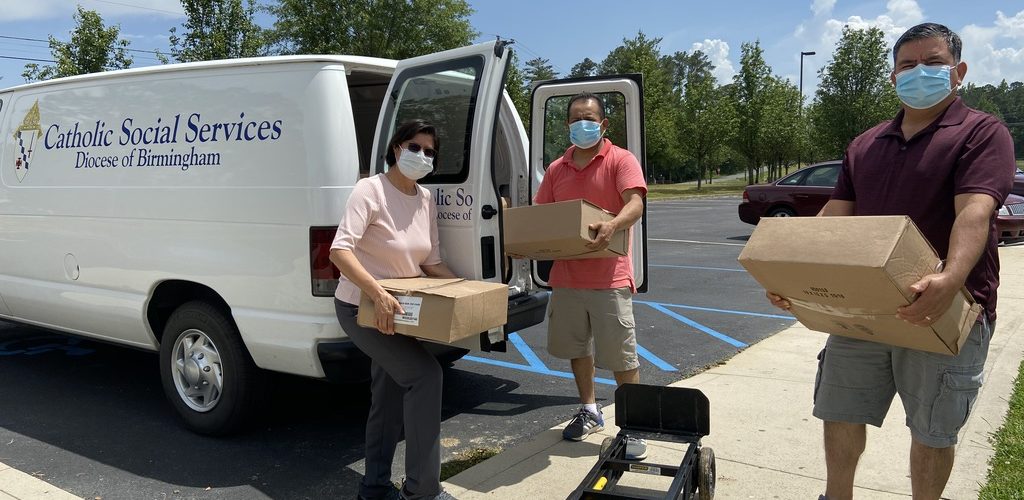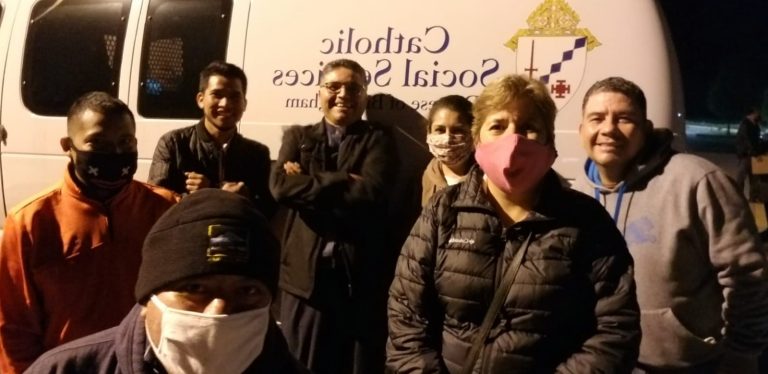
In Northern Alabama, Catholic Program Provides Support to Immigrants
The COVID-19 pandemic creates challenges yet cooperation in the local community
Guadalupan Multicultural Services of the Diocese of Birmingham, Alabama, otherwise known as “La Casita,” has provided a range of services to immigrants in northern Alabama for years.
Founded in August 2010 by the Sisters of Guadalupe, La Casita joined the Diocese of Birmingham in January 2011, as a provider of comprehensive services to the Hispanic community in the Birmingham area, including language instruction, social services, legal assistance, case management services, immigration processing support, and support to victims of domestic violence.
La Casita receives financial support from the Diocese of Birmingham but relies heavily on individual donors to help them serve the community. The staff consists of four sisters and two lay administrators.
In 2019, the program provided social services to 5,566 immigrant families, including medical assistance, education, and housing. They also provided 900 individuals with legal assistance and 1,569 families with economic assistance. So far in 2020, La Casita has served 3,600 families with a broad array of services.
La Casita has worked to adjust their services as the needs of the community change. During the COVID-19 pandemic, the program increased its outreach and service to migrants in vulnerable situations. Sr. Gabriela Ramirez MGSps, the director—informally known as Sr. Gaby—launched an initiative with local partners—health care providers, state offices, and local media—in March to assist immigrants during the COVID-19 pandemic with education, testing, and health-care support. The Hispanic community has been hit particularly hard by the virus in Alabama.
“The immigrant families are very vulnerable and are scared to visit public facilities to get testing and treatment,” Sr. Gabriela explains. “Without support, they are at risk of contracting the virus and becoming seriously ill.”
First recognizing the need for education, La Casita distributed Spanish and bilingual materials about the virus to local parishes to distribute among their parishioners, explaining the best practices of containing the virus. Working with local Spanish language media and other partners, La Casita also produced a series of online and radio programs to educate the Hispanic population about how to prevent infections from the virus.
Responding to a need for testing in the immigrant community, Sr. Gabriela and the staff at La Casita set up testing sites at 10 local parishes where immigrants can go to get tested for the virus and referred for treatment. Since the beginning of the pandemic, La Casita and its partners have provided health services to approximately 13,000 immigrants.
According to Sr. Gabriela, immigrants fearful of deportation are more likely to come to parishes for testing rather than to a government facility. The expanded testing helps improve the overall health of the immigrant community, as early detection helps reduce the spread of the virus and prevent immigrants from becoming seriously ill before seeking treatment. It also reduces the rate of emergency room visits in the Birmingham area.
As many immigrants have lost their jobs because of the pandemic, La Casita also has increased food assistance to immigrants in the area, providing produce and vegetables to over 700 families and food boxes to nearly 2,000 families. Immigrants in the Birmingham area work in a variety of jobs, including manufacturing, agricultural processing (poultry plants), service, and construction, making up 4 percent of the state’s workforce. They often work without the benefit of face masks and other protective gear and in substandard working conditions.
“Many of the parents are concerned about feeding their families, along with the possibility of being deported away from their children,” said Sr. Gabriela.
Finally, in cooperation with the Diocesan Office of Hispanic Ministry and the Religious Education office, La Casita has formed a diocesan “rapid response” team to connect the immigrant community with available community resources in the case of health-care emergencies. Volunteers located in each deanery of the diocese are responsible for monitoring their areas and intervening with assistance when necessary.
The local community, by and large, has been supportive of the work of La Casita and of the initiative to provide them help during the pandemic. “There are some who do not want to help the undocumented, but the majority are generous with their support.”
Sr. Gabriela says that immigration reform is the best path forward for the immigrants she serves: “Without legal status, these hard-working immigrant families live in fear and cannot fully contribute to society. They are unable to fully assert their God-given rights.” “The DACA population also needs permanent status, as they are particularly vulnerable,” she added.
In an article in the diocesan newspaper Our Voice, Sr. Gabriela concluded that the pandemic has “humanized us and in many ways brought us back to the basic teachings of Christ. It has raised a spirit of solidarity among our brothers and sisters to help those in need.”
Sr. Gabriela remains confident that the local community, working together, will overcome the challenges posed by the pandemic: “Although we continue to face uncertainties, we are convinced that it is in unity and through God’s Divine Providence that we will move forward and overcome any challenges.”
Read the entire Article:

